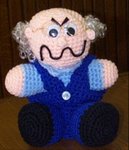
Just when you think you’ve seen it all, a recent decision out of the U.S. Tax Court last week sheds new meaning on the term “questionable expenses.”
It seems that from 2005 through 2008, former central Ohio television news anchor Anietra Hamper deducted an average of $21,000 annually in unreimbursed employment expenses. Among the expenses claimed? A cotton thong and lingerie, clothing, hair, nail and makeup expenses, teeth whitening, dry-cleaning costs, self-defence classes and magazine subscriptions to Cosmopolitan and Glamour.
During the years in question, Ms. Hamper was required to maintain a “specified professional appearance” as described in the “Women’s Wardrobe Guidelines.” These guidelines provide that the “ideal in selecting an outfit for on-air use should be the selection of ‘standard business wear,’ typical of that which one might wear on any business day in a normal office setting.”
Ms. Hamper argued that she wears her business clothing only at work and kept it separate from her personal clothing. She further explained that “the requirement to wear conservative clothing makes her business clothing unsuitable for everyday wear.”
According to court documents, the clothing purchased for work included traditional business suits, loungewear, a robe, sportswear, active wear, evening wear, as well as lingerie, a cotton bikini and cotton thong underwear.
Before deducting a particular clothing expense, Ms. Hamper would ask herself whether she would be buying the item if she didn’t have to wear it to work. “If the answer is no, then I know that I am buying it specifically for work, and therefore, it is a deductible business expense,” she testified.
The Court ruled that since the clothing Ms. Hamper purchased was suitable for everyday wear, even if it was not worn every day, she was not entitled to deduct it since the costs were “inherently personal expenses.”
The law in Canada is similar. B.C. financial advisor Hans Rupprecht attempted to deduct more than $8,400 of suits, ties, shirts and accessories he purchased in Vancouver.
Mr. Rupprecht testified that he wore these clothes for his work as a certified financial planner and “only for work purposes” and that he needed “suitable clothing” to go with his new office.
The Tax Court found that “clothing is prima facie a personal expense” and that the deduction of personal expenses is specifically prohibited by the Income Tax Act. As the Judge wrote, “Expenses relating to one’s personal appearance are the very essence of a personal expense and involve choices made by a taxpayer in preparing him or herself for work.”
Mr. Rupprecht lost in Tax Court in 2006 and again, upon appeal, in Federal Court in 2009. He sought leave to appeal to the Supreme Court of Canada, which last year turned down his request, as presumably the matter was not perceived to be of national importance.
Tuesday, March 8, 2011
You can look good for work- do not try to claim it as an expense
Posted by
The Old Tarf
at
5:41 AM
2
Strum a Chord or Three
![]()
Subscribe to:
Comments (Atom)

